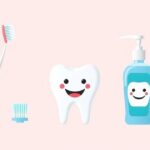As we reach our forties, oral health can often take a backseat to life’s daily demands. Many women experience fatigue and anxiety, affecting their dental care routines. But did you know that best natural vitamins for teeth over 40 can play a vital role in maintaining your smile? This article delves into the essential vitamins that nurture your teeth, making it easier for you to regain confidence in your health and wellness journey.
Understanding the Importance of Dental Health After 40
As we age, taking care of our health becomes a vital priority, especially our dental health. For women over 40, the mouth may face challenges such as gum disease, enamel loss, and cavities. These issues can be more than just cosmetic—they can lead to serious health problems. Many of us have felt that twinge of pain when biting into a crunchy apple or the anxiety of a dental visit. Understanding why our teeth need special attention becomes essential as we navigate this chapter of life.
Our bodies change, and so do our nutritional needs. Hormonal changes during menopause can affect saliva production, leading to dry mouth, which increases the risk of cavities. Thus, ensuring that we are taking the right steps to support our dental health is not only crucial for a bright smile but also for our overall wellbeing.
Key Vitamins for Strengthening Teeth and Gums
The right vitamins play a significant role in maintaining healthy teeth and gums. Here are some key vitamins that can help:
- Vitamin C: Promotes gum health and helps in the repair of tissues.
- Vitamin D: Supports calcium absorption, critical for strong teeth.
- Vitamin A: Important for the health of oral tissues.
- Vitamin K: Helps in bone metabolism and dental health.
Including these vitamins in your diet can lead to healthier gums and teeth, reducing the importance of extensive dental procedures in the future.
How Vitamin D Bolsters Oral Health
Vitamin D is often hailed as a miracle vitamin, and its benefits extend to our oral health. This vitamin plays an important role in calcium absorption—essential for maintaining strong teeth. Without enough Vitamin D, calcium can’t do its job. This leads to weakened tooth structures.
Additionally, Vitamin D helps the body fight off infections, including those that can lead to periodontal disease. A deficiency can be a silent contributor to oral health issues. Many don’t realize just how important sunlight and Vitamin D are in our diets.
The Role of Calcium in Tooth Strength
Calcium is the cornerstone of dental health. It forms the main part of our teeth and bones, making it vital for their strength. As we age, our bodies may not retain calcium as efficiently, leading to weakened enamel and increased vulnerability to decay.
Women, particularly post-menopause, are at greater risk of osteoporosis, affecting bone density, including in the jawbone. Not managing calcium intake can lead to dental problems, making it key to consume calcium-rich foods or consider supplementation to avoid these issues.
Antioxidants: Protecting Your Teeth from Damage
Antioxidants are not just buzzwords—they are essential in fighting damage caused by free radicals. These free radicals can harm our cells, including those in our gums and teeth. Vitamins A, C, and E are powerful antioxidants that contribute to oral health.
Foods rich in antioxidants help reduce inflammation and promote healing in gums. This means less risk of gum disease and a better chance of maintaining a healthy mouth as we age. Incorporating berries, nuts, and dark leafy greens can be delightful ways to boost your antioxidant intake.
Natural Sources of Essential Vitamins
Finding natural sources of essential vitamins for dental health can be as simple as visiting your local grocery store. Here are some foods to consider:
- Vitamin C: Oranges, strawberries, kiwi, and bell peppers.
- Vitamin D: Fatty fish, fortified dairy and cereals, and sunlight.
- Calcium: Dairy products, leafy greens, almonds, and tofu.
- Antioxidants: Berries, dark chocolate, and green tea.
Choosing these foods can enhance your diet, contributing positively not just to dental health but to overall wellbeing.
Supplements vs. Food: What’s Best for You?
While food is the best source of vitamins, supplements can provide an effective alternative, especially when dietary intake is inadequate. The question arises: is it better to choose supplements or focus on food sources?
Generally, whole foods offer additional benefits like fiber and other nutrients. However, if lifestyle or dietary restrictions are present, supplements can help fill the gaps. Consulting with a health professional can guide you in finding that perfect balance to support your dental health.
Creating a Healthy Routine for Your Teeth
Building a routine surrounding oral care is crucial as we age. Here’s a simple routine to consider:
- Brushing: Brush your teeth at least twice a day for two minutes with fluoride toothpaste.
- Flossing: Floss daily to remove plaque from between teeth.
- Regular Check-ups: Visit your dentist every six months for cleaning and check-ups.
- Nutrition: Include a variety of vitamins and minerals in your diet.
Integrating these habits can lead to healthier dental outcomes and overall better health. Think of them as small, manageable steps toward a better smile.
Real-Life Stories: Women Transforming Their Dental Health
Many women have experiences that reflect the journey of taking charge of their dental health. Stories of transformation and renewal are inspiring. For instance, consider the case of Janet, who struggled with gum disease for years. After she began focusing on her vitamin intake and regular dental care routine, her symptoms started to improve. The change was not immediate, but over time, her dedication paid off with healthier gums and a brighter smile.
Such stories are a testament to the power of making informed choices. They echo the sentiment that while the path may be tricky, determination and knowledge can yield incredible results.
Taking the First Step: A Simple Guide to Better Dental Care
Change begins with that initial step—sometimes it’s about making small, manageable choices. Here’s a simple guide to improve your dental health:
- Assess your diet: Identify any gaps in your vitamin intake.
- Set reminders: Establish a brushing and flossing regimen.
- Stay informed: Read about dental health and new studies.
- Seek help: Consult with dental professionals for personalized care.
Remember, it’s never too late to improve your dental health. Women everywhere are taking similar steps and experiencing the benefits firsthand. Every small change contributes to a long-term impact on your smile and confidence—believe in your capacity to transform your dental health.






